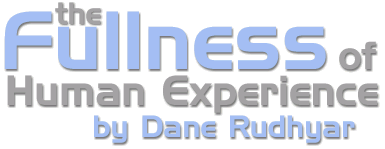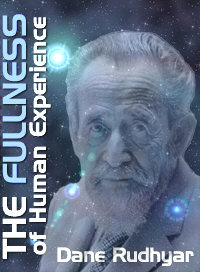 |
| Home | Bio | Art | Music | Literature | Civilization & Culture | Philosophy of Wholeness | Theosophy & Spirituality | Astrology |

CHAPTER TWO
Wholeness and the Experience of Periodic Change - 3 Living in the now The non-existence of time after the period of beingness of any whole has ended does not imply the cessation of the continuum of change, or of the succession of situations produced by the cyclic interplay of the two principles of Unity and Multiplicity. This interplay is what human beings perceive as motion, or the dynamic character of Wholeness. Motion implies the unceasing passing from one state of Unity-to-Multiplicity relatedness to the next The word passing is stressed because as one deals with the process of change as a cyclic whole (the Movement of Wholeness), one no longer focuses attention upon moments of time, as if they could be separated from one another, but rather upon the sequence of changes. Nevertheless, if one intends to define the exact relation of an experienced event to markers of time in terms of the activity of conscious, autonomous, and responsible individuals, one has to refer to a precise moment assumed to have a specific character. One has to time (verb form) actions according to an experienced or required sequence of time-entities (moments) and the possible speed at which the actions can be carried out. In order to make such a process possible, mind has to interpret the experience of sequence (of before and after) in terms of the quasi-dimensionality of past, present, and future. The individualization of "time units" called moments and made (consciously or not) to resemble living organisms that are born, mature, and die, is undoubtedly necessary when the ego and its desires dominate the human situation. Moreover, at this stage a clearcut distinction is made between an experiencing subject and what it experiences as if it were outside itself. But this is only a phase, however enduring and tenacious, of the human experience of change on which the awareness of existence itself is based. Whether it is the individualization of the continuum of change or that of the state of personhood, individualization inevitably engenders a great deal of confusion and misunderstanding. The concept of action "in the present" is particularly confusing. The reason is that, strictly speaking, the present is only a dimensionless line of demarcation between past and future. It has no more dimensionality than, in geometry, the lines forming a triangle have thickness, or a mathematical point has spatial extension. The present separates the future from the past but it is also their merging into each other. Where the future meets the past is a very vaguely defined yet extensive moment or series of moments called "now." When philosophers, psychologists and mystics speak of "living in the now," they refer to a more or less brief period of transition which actually has a time-dimension, though it may be characterized as "timeless" because of its special quality as the moment at which the human capacity for decision and action should be focused. What is meant by "living in the now" (as we are acting or taking decisions) is to be neither affected (or even haunted) by the memory of past experiences — our own and/or those of our ancestors, educators or associates — nor fascinated by an over-idealized and unrealistic subjective longing for a future state, or by an unrealistic, fear of what it may bring. It is also to face in a thoroughly awake condition of consciousness, and with focused intent whatever situation may be just ahead. The situation has not come; it is not "present" Yet one should be in a constant state of readiness to meet it For instance, if the driver of a car allows his feelings to dwell upon a deeply depressing past experience of frustrated love, or lets his imagination be entranced by the glowing mistiness of Utopian expectations, so that attention is not focused on the road, he may fail to react effectively to the erratic action of another driver suddenly in the wrong lane, and a fatal head-on collision may occur. In this case, of course, the computer-like level of the mind may have been programmed or trained to react automatically in the correct manner. But any training process implies a reference to and use of a knowledge based on collective past experience, and it even includes a certain amount of expectation — the expectation of possible results. When a modern philosopher-psychologist eulogizes living in the now, he or she actually means meeting life's experiences as an individual being no longer motivated and deeply affected by the way of thinking-feeling-behaving which family and culture had imposed upon mind-development since birth. Theoretically, living in the now should mean being totally unconditioned by any past But one is always conditioned by the past, whether it be the past of the long process of biological evolution which built a human body and its brain, or the past of a people and their culture which provided a language with definite words and a syntax establishing rigid structures of relationship between all the elements of experience. The more intense (as well as traumatic or fame-producing) the events of the first part of a person's life have been, the more impossible it will be for the biological, psychic, and intellectual impressions of these events to be totally eradicated, especially if the person claiming to live in the now has been motivated (consciously or not) by the occurrences to build on them a philosophy of life. The phrase living in the now may be a convenient way of systematizing and perhaps glorifying a somewhat self-conscious approach to human existence, stressing the specific quality of a newly activated center of individualized consciousness. Having succeeded to some degree in freeing itself from the binding pressures of culture, and being eager to emphasize the value and excitement of that "liberation" — however relative it may have been — this new center of consciousness is, as it were, mythologizing its feeling-responses. The basic issue is always the nature or stage of evolution of who it is that "lives in the now." Plants and wild animals live in the now, because life "lives them" in terms of its indismissible needs and instinctual modes of response. In his Epistles, Paul states that he is no longer a separate individual entity that "lives," because God "lives him." To many mystics and theosophists, living in the now implies living in the presence of God or the "Master." But the realization of such a "presence" should not be confused with what, in relation to past and future conditions of existence, is called "the present." Nothing can be done in the present, for the present — I repeat — is only an abstract line separating past from future. Yet it need not be considered a dimensionless line; it need not separate any condition of being, if the passing — the moment of being — is experienced as a presence, as the dynamic aspect of Wholeness. There is motion always and everywhere. That motion is structured, operating as wholes of change, as cycles or eons. Living in the now implies a focusing of the attention of the experiencing subject upon one particular phase of the cycle of change. In the fullest experience possible to a human being, any phase of the Movement of Wholeness is lived in terms of what it reveals of the structure and meaning of the whole eon — thus sub specie eternitatis. The moment is lived in the presence of Wholeness. Through it the entire cyclic interaction of the two great principles of Unity and Multiplicity is envisioned. This interaction operates always and everywhere, yet it is ever-changing. Because variations are possible it is always new; yet, as we shall see, it is also invariant in its total structure because every variation is balanced by a compensatory action. How puny is any "now" unless one can feel in and through it the immense resonance of the whole cycle — the "always and everywhere" of unconditioned Wholeness! Yet the destiny, function, or dharma of humanity requires both that the expansive power of desires for self-actualization and that the capacity of the mind at the human level to objectify, entitize, analyze, and measure, should experience their fullest possible development in Man. The pressure of the principle of Multiplicity compels men and women to focus their attention upon parts and the mutual interaction of these parts, rather than to resonate to the rhythm of Wholeness in any whole. The same pressure leads the human mind to dimensionalize the continuum of change. That pressure must be obeyed during the phase in the evolution of human culture in which the dominant desire of the subjective factor in human experience is to express itself as an ego. The ego is unconcerned with the deep tide of human evolution because it feels essentially separate from other individual persons with conflicting ambitions. Then the human mind has to measure all it perceives, because it is urged to control the energies latent in nature for the satisfaction of ever-new desires. The most crucial and fateful application of the power to measure is the measuring of time — time now objectivized as a commodity and no longer whole, no longer cyclically structured; the time of stop-watches and electronic interferometers and of the abstract equations of the Einsteinian Theory of Relativity. By permission of Leyla Rudhyar Hill Copyright © 1986 by Leyla Rudhyar Hill All Rights Reserved.  Web design and all data, text and graphics appearing on this site are protected by US and International Copyright and are not to be reproduced, distributed, circulated, offered for sale, or given away, in any form, by any means, electronic or conventional. See Notices for full copyright statement and conditions of use. Web design copyright © 2000-2004 by Michael R. Meyer. All Rights Reserved. |
 |
